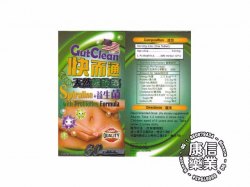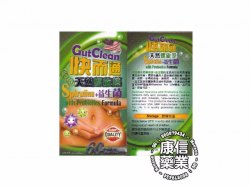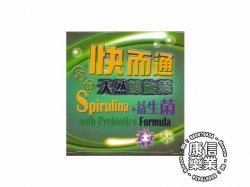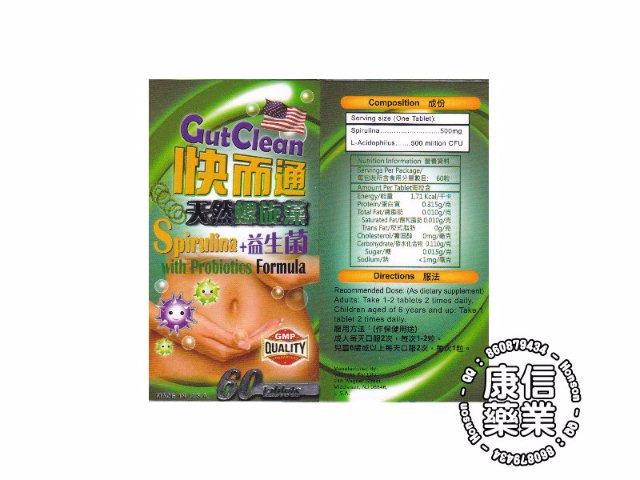
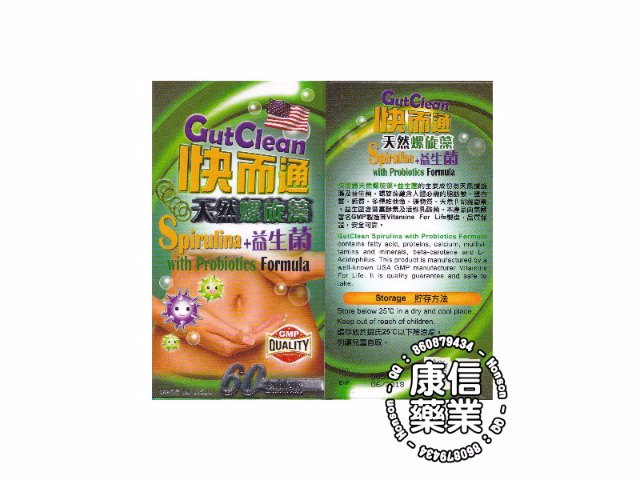
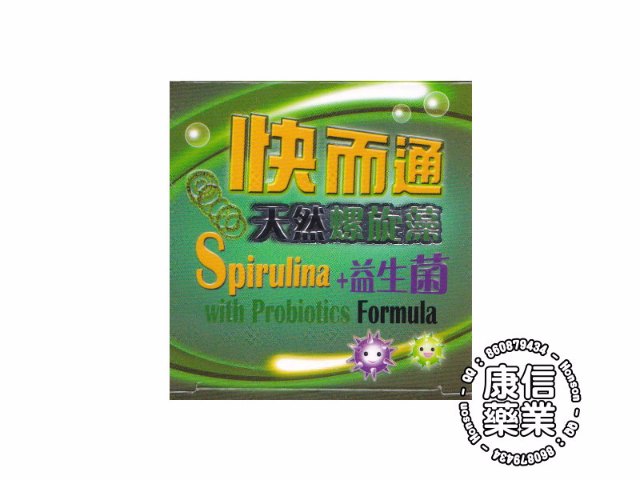


GutClean(Spirulina with Probiotics Formula)
Model: WZJ0101
Product Description
GutClean(Spirulina with Probiotics Formula)
Do you have the following problems?
Indigestion ,Constipation ,Halitosis,Acne ,Abdominal Distention,Smelly Fart ,Diarrhea
People with imbalance diet and inadequate water and fiber intake are common causes of bad gut conditions in metropolitan life. With accumulation of feces in guts, toxins are produced by harmful bacteria and are likely to be re-circulated into the body, causing various health problems.
GutClean(Spirulina with Probiotics Formula) contains two types of natural micro-organisms, Spirulina and Probiotics which can help maintain various functions of gastrointestinal and digestive system.
Probiotics Maintain Balance of Gut Microflora
Probiotics (derived from Greek, meaning“for life”)are live microorganisms (in most cases, bacteria) that are similar to beneficial microorganisms found in the human gut, They are also called "friendly bacteria" or "good bacteria". Most often, the bacteria come from two groups, Lactobacillus or Bifidobacterium.
The Food and Agriculture Organization of the United Nations (FA〇) and the World Health Organization (WHO) defined probiotics as “Live -microorganisms which when administered in adequate amounts confer a health benefit on the host,” [3—] Friendly bacteria enter human gut as 'live microorganisms" and help the balance of intestinal microflora. They are vital to proper development of the immune system, protection against pathogens that Gould cause disease, and the digestion and absorption of food and nutrients,,
Mixture of microorganisms varies in each person. Interactions between a person and the microorganisms in his body, and among the microorganisms themselves, can be crucial to the person's health and well-being. According to the conference report of National Center for Complementary and Alternative Medicine, some uses of probiotics for which there is some encouraging evidence from the study of specific probiotic formulations are as follows:
Gastrointestinal Health
Probiotics can prevent and treat acute diarrhea caused by rotavirus in children; They can also prevent the occurrence of antibiotic-associated diarrhea caused by Clostridium difficile. The role of probiotics is closely related to the development of many gastroenterology diseases such as chronic gastritis, digestive tract ulcers and constipation.:Some strains resist to acid and adhere to the cell wall of the stomach. They inhibit the growth of Helicobacter pylori from developing to peptic ulcers.
l Inflammation Disease and Bowel syndrome
Probiotics can alleviate the symptoms of irritable bowel syndrome or prevent inflammation bowel diseases such as pouchitis.
l Suppress Urogenital Inflections
Some strains of probiotics have acidified effect on urogenital system, they can lower pH value to suppress the growth of pathogens by competing the spaces and resources for colonization,
l Enhance Immune System
Probiotics produce organic acids, free fatty acids, hydrogen peroxide, and bacteriocins, and the ability to inhibit the growth of pathogens. [7]
l Alleviate Allergy Responses
Probiotics regulate the level of immunoglobulin E (IgE) to reduce the allergy response. Researches show that they can prevent and manage atopic dermatitis (eczema) in children.
l Lactose Intolerance
Probiotics assist in gastrointestinal digestion by converting lactose to lactic acid, this can alleviate lactose intolerance.
The Nutritious Spirulina for Health
Spirulina are a large number of cyanobacteria or blue-green algae. These algae are found in warm, alkaline waters around the world, especially of Mexico and Central Africa. The nutritional values of Spirulina have drawn attention over a few decades:
Contain high content of protein (60-70%) which is 3 times higher than fish and meat (beef protein content is about 20%)
As a source of many types of essential amino acids which human body cannot synthesize
l Consist of multivitamins, especially B12 and [3-carotene, β -carotene is an antioxidant which could suppress the damage to cells by free radicals, slow down aging and chronic diseasess. In human body, p-carotene is converted to pro-vitamin A which has beneficial effects to the eyes and skin.[11]
l Rich in multi-minerals, such as iron, potassium, sodium, magnesium and calcium
l Serve as a source for high content of EPA and gamma-linoleic acid
l Compose high content of DNA and RNA. Spirulina also contains phycocyanin, which together with chlorophyll are antioxidizing chemicals.
Prevent malnutrition
Increase level of lactobacillus
Enhance absorption of vitamin B1 and other vitamin等m Neutralize heavy metals and toxins for kidneys
Recommended daily dose:
Adults: Take 1-2 tablets 2 times daily.
Children aged of 6 years and up: Take 1 tablet 2 times daily,

